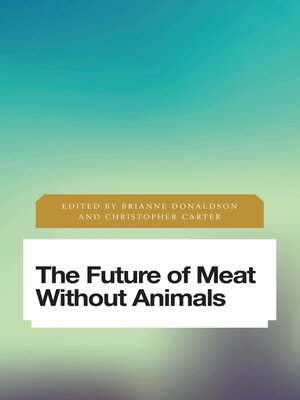The Future of Meat Without Animals
ebook ∣ Future Perfect: Images of the Time to Come in Philosophy, Politics and Cultural Studies
By Brianne Donaldson

Sign up to save your library
With an OverDrive account, you can save your favorite libraries for at-a-glance information about availability. Find out more about OverDrive accounts.
Find this title in Libby, the library reading app by OverDrive.



Search for a digital library with this title
Title found at these libraries:
| Library Name | Distance |
|---|---|
| Loading... |
Plant-based and cell-cultured meat, milk, and egg producers aim to replace industrial food production with animal-free fare that tastes better, costs less, and requires a fraction of the energy inputs. These products are no longer relegated to niche markets for ethical vegetarians, but are heavily funded by private investors betting on meat without animals as mass-market, environmentally feasible alternatives that can be scaled for a growing global population.
This volume examines conceptual and cultural opportunities, entanglements, and pitfalls in moving global meat, egg, and dairy consumption toward these animal-free options. Beyond surface tensions of "meatless meat" and "animal-free flesh," deeper conflicts proliferate around naturalized accounts of human identity and meat consumption, as well as the linkage of protein with colonial power and gender oppression. What visions and technologies can disrupt modern agriculture? What economic and marketing channels are required to scale these products? What beings and ecosystems remain implicated in a livestock-free food system?
A future of meat without animals invites adjustments on the plate, but it also inspires renewed habits of mind as well as life-affirming innovations capable of nourishing the contours of our future selves. This book illuminates material and philosophical complexities that will shape the character of our future/s of food.
This volume examines conceptual and cultural opportunities, entanglements, and pitfalls in moving global meat, egg, and dairy consumption toward these animal-free options. Beyond surface tensions of "meatless meat" and "animal-free flesh," deeper conflicts proliferate around naturalized accounts of human identity and meat consumption, as well as the linkage of protein with colonial power and gender oppression. What visions and technologies can disrupt modern agriculture? What economic and marketing channels are required to scale these products? What beings and ecosystems remain implicated in a livestock-free food system?
A future of meat without animals invites adjustments on the plate, but it also inspires renewed habits of mind as well as life-affirming innovations capable of nourishing the contours of our future selves. This book illuminates material and philosophical complexities that will shape the character of our future/s of food.







